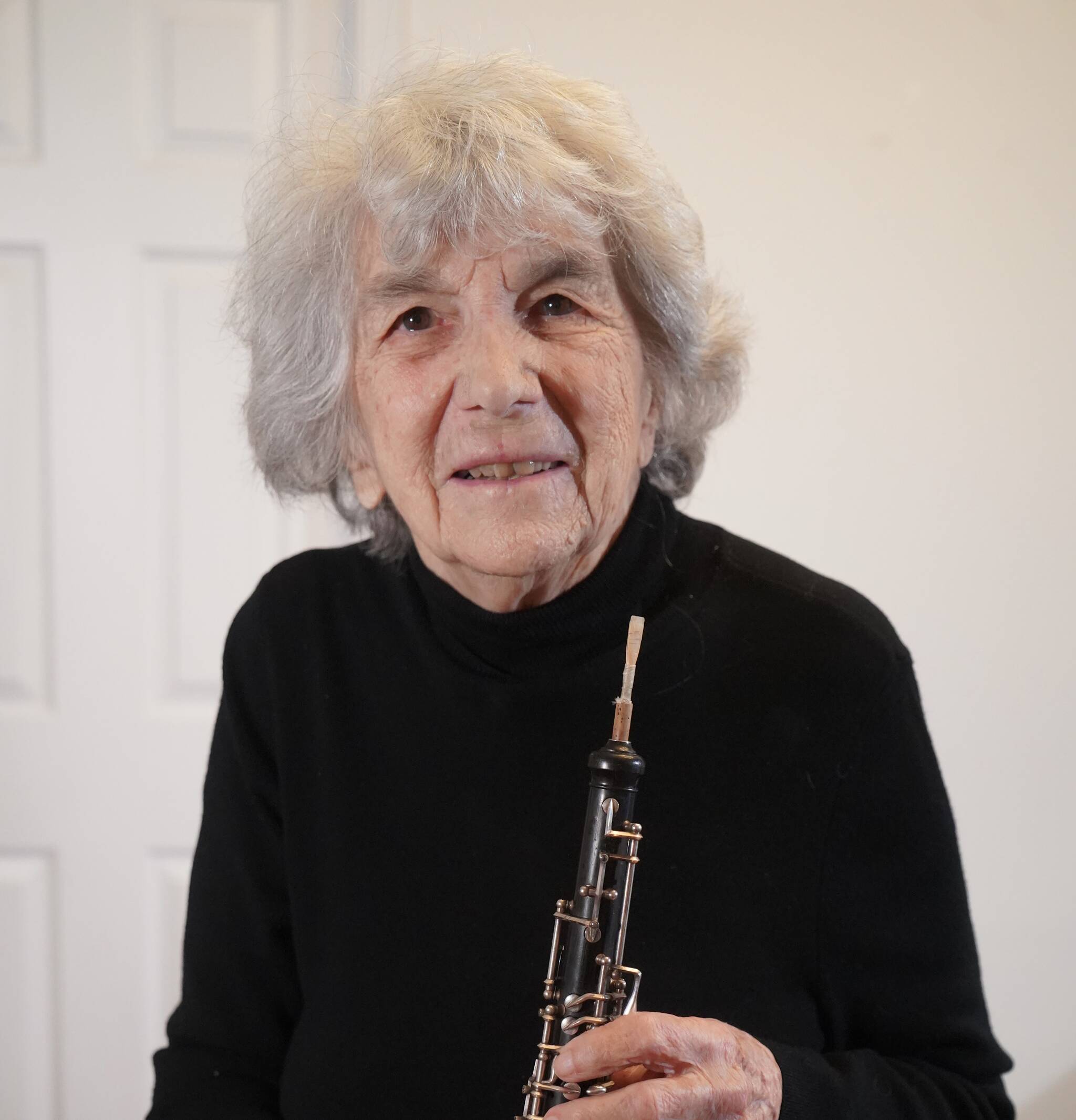Laila Storch Friedmann – oboist, trailblazer, author, baker, linguist, and adored wife, mother, grandmother, mother-in-law, and friend – passed away December 2, 2022, age 101, on Orcas Island, Washington. She was surrounded by family and friends and her favorite cat, Oscar.
Laila was born on February 28, 1921, and grew up in Santa Rosa, CA. At the age of three, her favorite pastime was dropping pussy willows on spinning phonograph records, and in the process she became fascinated with the music she heard. After an ill-fated attempt at the violin, she gravitated toward wind instruments. She started the oboe primarily because the school’s flutes were already taken. After studying in San Francisco, she insisted on auditioning at the Curtis Institute of Music in Philadelphia, despite being told that renowned oboist Marcel Tabuteau didn’t take female students. In fact, she became the first female oboe student to graduate from Curtis, she developed a lifelong expertise in Tabuteau’s teaching methods, and she served as secretary and friend to the Tabuteaus for many years.
Her orchestral positions included the National Symphony, the Kansas City Philharmonic, the Chicago Little Symphony, and the Puerto Rico Symphony Orchestra. In 1948 she was offered the position of Principal Oboe of the Houston Symphony Orchestra, pioneering a path for women in prominent orchestral positions throughout the country. Laila performed in the Marlboro, Carmel, and Bethlehem Bach Festivals and for seven seasons at the Casals Festival. Throughout her career she worked with Sir Yehudi Menuhin, Efrem Kurtz, Pablo Casals, Bruno Walter, Leopold Stokowski, Dimitri Mitropoulos, Sir Thomas Beecham, and her favorite conductor of all, Ferenc Fricsay.
In 1955, on a Fulbright grant, she performed in Austria in the American Wind Ensemble of Vienna, and during the 1957-58 season was principal oboe of the Mozarteum Orchestra in Salzburg. While in Vienna, she met violinist Martin Friedmann, who followed her to Salzburg and then Siena, Italy. They married in Rome in 1957 with pianist Leon Fleischer as their witness. Aloysia was born in 1959 while the couple lived in Wilkes-Barre, PA. They moved for a few years to Puerto Rico when Laila joined the Soni Ventorum Wind Quintet. With the quintet, the family relocated to Seattle, WA, where Laila became Professor of Oboe at the University of Washington. Her travel opportunities increased with the quintet, which embarked on numerous international US State Department tours. She was also a guest professor at Indiana University and the Oberlin Conservatory of Music.
Laila Storch’s remarkable career intersected with significant moments in history. In Prades, France, in 1954, she helped famed photographer Yousuf Karsh light his subject in what became the most famous photo, taken from behind, of cellist Pablo Casals. In 1962, playing oboe d’amore, she joined the Robert Shaw Chorale on a concert tour of the USSR, performing against the backdrop of the Cuban Missile Crisis back home. In 1989, in Beijing, as the first foreign visiting professor in the history of the Central Conservatory of China to teach in Mandarin, she heard shots ring out in Tiananmen Square.
After being acknowledged in the New York Times in 1995 as “a revered chronicler of oboe lore,” Laila began work on a biography of Marcel Tabuteau. Over a ten-year period she interviewed oboists, dug through her archives, and with painstaking research and a natural ear for prose, wrote Marcel Tabuteau: How Do You Expect To Play The Oboe if You Can’t Peel a Mushroom? Published by Indiana Press in 2008, it was re-released in paperback in 2018.
Laila was a staunch supporter of her daughter Aloysia’s desire to start the Orcas Island Chamber Music Festival in 1998 and was a founding director of the Board. She performed several times in the festival, including a virtuoso etude by Émile Paladilhe in her 80th year, and remarkably, a J.C. Bach quintet with her family at the age of 93. Her talent for music went back many generations, and a particular thrill for Laila was hearing her great-great-grandfather Alois Bohuslav Storch’s Missa Solemnis in C and Requiem given their world premiere performances on Orcas Island and in Seattle.
One passion of Laila’s was baking in the true Viennese tradition. She was rarely satisfied with her oboe reeds, but took great pride in her Kaiser Gugelhupf, Rehrücken, Vanilli Kipferl, Lebkuchen, Linzer Torte, Zimtsterne, and Ungefüllte Mandeltorte.
Her family thanks Dr. Zubin Vasavada, Kathy Schradle, Leslie Seaman, Amy Cole, Tracy McQueen, Melanie Krueger, Claire Hensler, Fisher Dickens, Hospice of the Northwest, and the many others who took such good care of Laila in her last years. She leaves her daughter, Aloysia Friedmann, her son-in-law, Jon “Jackie” Kimura Parker, her granddaughter, Sophie Parker, her niece, Manuela Friedmann, relatives including Leonie Sandercock, Nancy Lee, Erin Hawk-Miller, Kathleen Elliott, relatives in Vienna, and friends. She was preceded in death by her husband, Martin Friedmann, in 2019, her brother-in-law, John Friedmann, in 2017, and her niece’s mother, Waltraut Friedmann, in 2020.
In the past two years, Laila enjoyed living on Orcas Island with Aloysia, Jackie, and Sophie, surrounded by paintings by her mother, Juanita Storch, watching the birds in Obstruction Pass, playing with cats Oscar and Scout and dog Ricky, having croissants in the morning, watching Rick Steves’ Europe and classic Charlie Chaplin films in the afternoon, and attending festival concerts. In 2020, she was delighted to be featured in the cover story — Laila Storch at her Centenary — of the International Double Reed Society’s quarterly journal, which featured reminiscences from many in the oboe world.
A celebration of life for Laila will be planned for a future date. In lieu of flowers, memorial gifts may be made to the Orcas Island Chamber Music Festival (oicmf.org), Seattle Audubon (seattleaudubon.org) or the Bahá’í Faith (bahai.org).




